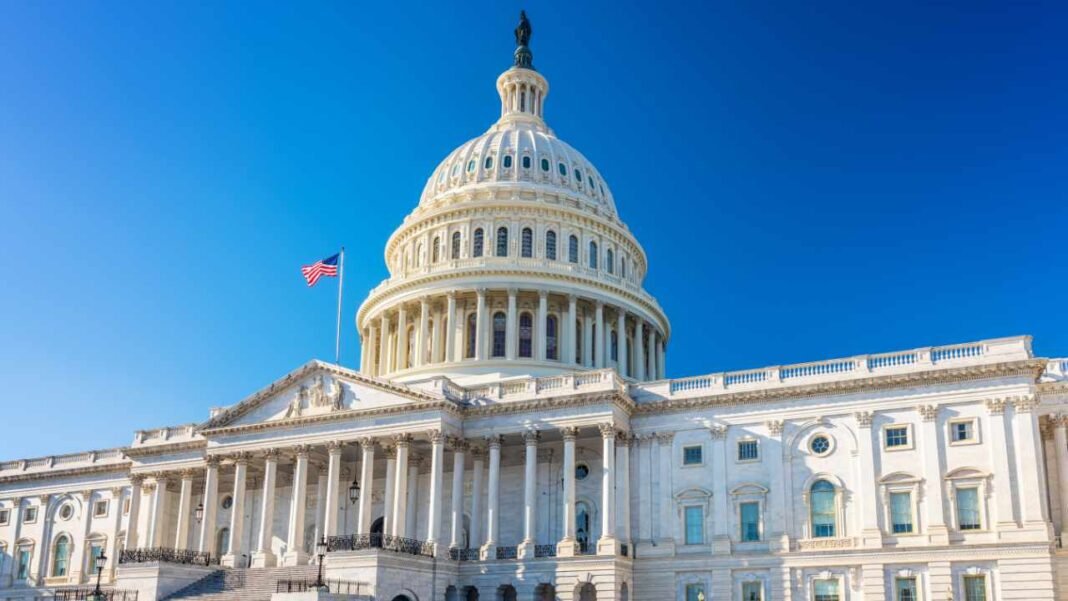U.S. lawmakers have raised considerations concerning the revolving door between monetary regulators and the crypto trade. “Over 200 authorities officers have moved between public provider and crypto corporations,” the lawmakers mentioned, including that they come with 31 Treasury Division officers and 28 Securities and Alternate Fee (SEC) officers. Revolving Door Between Monetary Regulators, Like SEC, and […]

U.S. lawmakers have raised considerations concerning the revolving door between monetary regulators and the crypto trade. “Over 200 authorities officers have moved between public provider and crypto corporations,” the lawmakers mentioned, including that they come with 31 Treasury Division officers and 28 Securities and Alternate Fee (SEC) officers.
Revolving Door Between Monetary Regulators, Like SEC, and Crypto Business
5 U.S. lawmakers have despatched a letter to seven monetary regulators inquiring about measures they’re taking to stop the revolving door between their companies and the crypto trade. The letters, dated Oct. 24, have been signed via Sen. Elizabeth Warren (D-MA), Sen. Sheldon Whitehouse (D-RI), Rep. Rashida Tlaib (D-MI), Rep. Alexandria Ocasio-Cortez (D-NY), and Rep. Jesús G. “Chuy” García (D-IL).
The letters have been despatched to Securities Alternate Fee (SEC) Chair Gary Gensler, Commodity Futures Buying and selling Fee (CFTC) Chair Rostin Behnam, Treasury Secretary Janet Yellen, Federal Reserve Chair Jerome Powell, Federal Deposit Insurance coverage Company (FDIC) Performing Chair Martin Gruenberg, Place of job of the Comptroller of the Forex (OCC)’s Performing Comptroller of the Forex Michael J. Hsu, and Client Monetary Coverage Bureau (CFPB) Director Rohit Chopra.
“We write looking for details about the stairs your company is taking to prevent the revolving door between our monetary regulatory companies and the cryptocurrency (crypto) trade,” the lawmakers wrote. “The crypto sector has all of a sudden escalated its lobbying efforts in contemporary months, spending tens of millions in an try to protected favorable regulatory results as Congress and federal companies paintings to craft and put into effect regulations to keep watch over this multi-trillion greenback trade.”
They defined:
As a part of this affect marketing campaign, crypto corporations have employed masses of ex-government officers … and we’re involved that the crypto revolving door dangers corrupting the policymaking procedure and undermining the general public’s accept as true with in our monetary regulators.
“In line with the Tech Transparency Mission, over 200 authorities officers have moved between public provider and crypto corporations, serving as advisers, board participants, buyers, lobbyists, prison recommend, or in-house executives,” the letter main points.
The lawmakers added that they come with a minimum of 31 Treasury Division officers, 28 SEC officers, 15 CFTC officers, six Federal Reserve officers, 5 OCC officers, 3 CFPB officers, and two FDIC officers.
The letter continues:
Those officers sign up for a minimum of 8 former participants of Congress, 79 former congressional staffers, and 32 former White Area officers who’re recently advising or lobbying for crypto pursuits.
“American citizens must be assured that regulators are operating on behalf of the general public, slightly than auditioning for a high-paid lobbying activity upon leaving authorities provider. The all of a sudden spinning revolving door out of presidency and into the crypto sector, on the other hand, undermines each imperatives,” the lawmakers wired.
Their letters conclude with a listing of questions regarding every company’s pointers to stop a revolving door with the crypto trade. As an example, one query asks about what ethics and transparency regulations are in position to verify the integrity of company officers. Any other query considerations how every company protects its insurance policies from being unduly
influenced via present or former staff’ doable conflicts of hobby. The regulators have been requested to offer solutions via Nov. 7.
What do you consider the revolving door between monetary regulators and the crypto trade? Tell us within the feedback segment beneath.









![Methods to Purchase DeFi Pulse Index on CoinStats [The Ultimate Guide 2022]](https://bitrrency.com/wp-content/uploads/2022/05/DeFi_Pulse_og-100x70.png)

